
Dwarf goats vs. miniature sheep
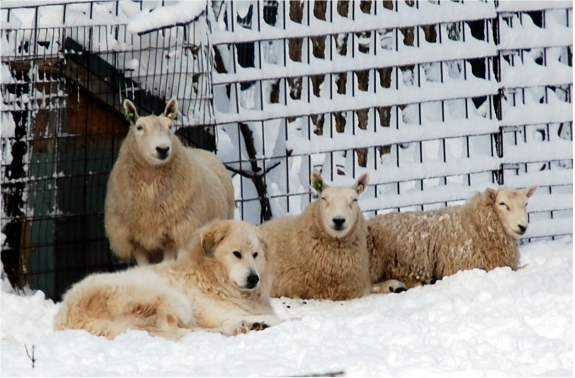
Mark and I have agreed
to table the issue of weed-eating livestock until spring or when we
have another
half acre fenced in
(whichever comes last), so I've been contenting myself with
research. I contacted a few breeders of Miniature
Cheviot Sheep to
figure out a ballpark estimate of how much it would cost us to get
started with a ram and ewe (around $500), and in the process "met"
Terri Brown, who turns out to keep both Miniature Cheviot Sheep and
Nigerian Dwarf Goats. She kindly agreed to let me post her
experiences (and some of her beautiful photos) on the blog to share
with you all.
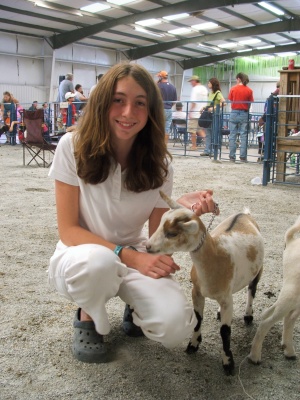 Terri's 4H clubs runs petting zoos as fundraisers and she also
uses her livestock for milk, show, and pets, so her farm contains quite
a menagerie. I'll let her tell you the story in her own words:
Terri's 4H clubs runs petting zoos as fundraisers and she also
uses her livestock for milk, show, and pets, so her farm contains quite
a menagerie. I'll let her tell you the story in her own words:
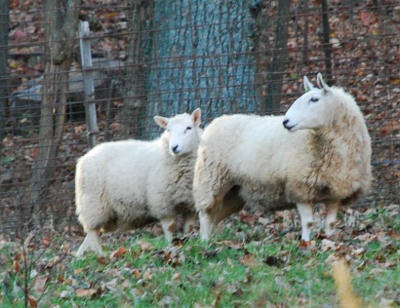 I explained our situation to
Terri and asked her whether she thought we'd be better off with
miniature sheep or dwarf goats, and she replied:
I explained our situation to
Terri and asked her whether she thought we'd be better off with
miniature sheep or dwarf goats, and she replied:
We got our Nigerian Dwarfs in 1993 and have never regretted it. They have doggy personalities and become part of the family. Nigerians are perfect for attacking wild
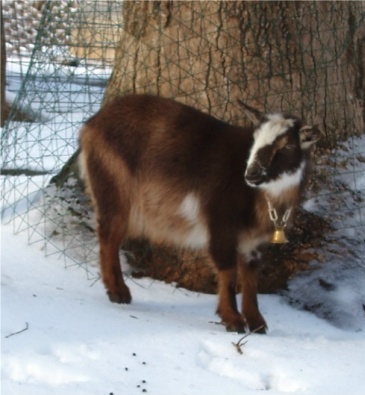 brush... honeysuckle, brambles,
poison ivy (don't pet them afterwards!), and unwanted saplings.
They don't prefer grass and low forbes, however, so you end up mowing
that. We got the lambs last year for our pet zoos but find they
are wonderful mowers.
brush... honeysuckle, brambles,
poison ivy (don't pet them afterwards!), and unwanted saplings.
They don't prefer grass and low forbes, however, so you end up mowing
that. We got the lambs last year for our pet zoos but find they
are wonderful mowers.The Nigerians are polyestrous and produce kids & milk in any season. The sheep only breed in the fall, and if you miss it, oh well maybe next year? They only have singles or twins, unlike our goats who have triplets, quads and more! So the herd grows slowly, especially when three quarters of the flock are rams (at least in MY flock....)
My hubby, Mark, and I both agree Miniature Cheviot Sheep are a delight! Their uncomplicated way of thinking is a respite in our busy lives. They hang out together in a simple, fluffy white, peaceful group, rarely putting on a show like the goats do. The mini sheep are a blast at the county fair, getting a lot of attention in addition to winning a bunch of cash because they have their own division. Each species has its charm, and they do complement each other.
If we had more pasture,
it sounds like Terri's system of using both sheep and goats would be a
good one. Here's what she has to say about dual-caprine pasture
weed control:
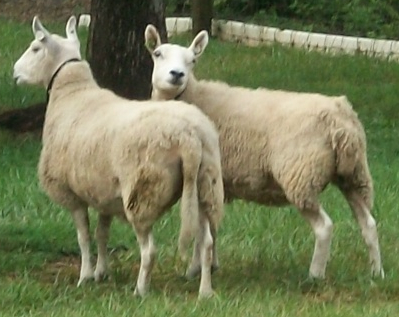 They can be run together but I
prefer to rotate them through. I don't like having more than four
to six individuals per pen because of competition for food and my
attention, and mixing the two species is more complicated. They
have different ways of getting my attention, so it becomes a total mob
scene when they are together. Plus, although they can get along
sharing food, they each do better with their own special mixtures of
grain & minerals.
They can be run together but I
prefer to rotate them through. I don't like having more than four
to six individuals per pen because of competition for food and my
attention, and mixing the two species is more complicated. They
have different ways of getting my attention, so it becomes a total mob
scene when they are together. Plus, although they can get along
sharing food, they each do better with their own special mixtures of
grain & minerals.Never keep rams & bucks together; the bucks rear up and the rams bust their gut or bash them low from behind. I don't think wethers practice that behavior, but I don't have any yet so we'll see.
Terri concluded:
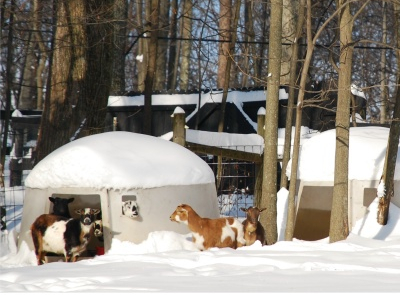 Miniature animals of all types are the rage
nowdays. Smaller families want a little taste of farmy life, and
they find poultry and small sheep & goats fit into their
lives. They want a small animal with less expensive shelter &
fence & transport requirements, and something that is more like a
pet. The Nigerian Dwarfs and Mini Cheviots win on both
counts.
Miniature animals of all types are the rage
nowdays. Smaller families want a little taste of farmy life, and
they find poultry and small sheep & goats fit into their
lives. They want a small animal with less expensive shelter &
fence & transport requirements, and something that is more like a
pet. The Nigerian Dwarfs and Mini Cheviots win on both
counts. Being registered helps, too, which guarantees the buyer that their babies will also be small, and gives you credibility as a reputable breeder (which you honor by helping the buyer get started right and by not selling sick babies).
Thanks so much for all
of that great information, Terri! If anyone's interested in
hiring a petting zoo for their DC area birthday party or buying
registered Nigerian Dwarf Goats or Miniature Cheviot Sheep, drop by
Terri's website at WoolyDogDown.com.
Want more in-depth information? Browse through our books.
Or explore more posts by date or by subject.
About us: Anna Hess and Mark Hamilton spent over a decade living self-sufficiently in the mountains of Virginia before moving north to start over from scratch in the foothills of Ohio. They've experimented with permaculture, no-till gardening, trailersteading, home-based microbusinesses and much more, writing about their adventures in both blogs and books.
Want to be notified when new comments are posted on this page? Click on the RSS button after you add a comment to subscribe to the comment feed, or simply check the box beside "email replies to me" while writing your comment.

I have Border Cheviots on my farm - they are smaller than North Country Cheviots but larger than Miniature Cheviots. They are not the most friednly of sheep (after a year, only one will eat out of my hand), but they seem to be quite hardy - they did not use our run in shed during the winter.
If you are looking to have a flock, I don't think you necessarily want to get 1 ram and 1 ewe. We started with 5 ewes and "rented" a ram for November and December, and all but one got pregnant. Sheep are herd animals and they tend to spook if there are less than three. Also, if the ram and ewe are always together, you will have a harder time dating a pregnancy, which turns all night lamb watch from a few weeks to potentially months.
I highly recommend the book Living With Sheep. All the other ones I own are completely useless/ tell you how easily your sheep will die.
The last tip - I've read that goats and sheep are susceptible to the same parasites, so you have to rotate your pastures with that in mind (whereas sheep and cows have different worms, so many folks first have their cows on grass and follow up with the sheep to mow it down further).
Regardless of what animal you decide on, will you use Lucy to protect them or are you planning on getting an LGD? Or are you planning on locking them up every night? Selfishly enough, one reason I want to get either sheep or goats eventually is that, in addition to the milk and meat benefits, I am in love with the idea of having a mighty Great Pyr or other LGD breed protect them (as well as my chickens).
Sarah in Boulder Creek, CA
Lisa --- I appreciate you saying that about wanting to have at least three sheep. I was assuming at least two would be fine for companionship, but it sounds like you might need more sheep than goats, which would be a point against them for our farm.
Renting a ram would be problematic for us if we ended up with miniature sheep --- they seem to be so few and far between that we'd have to drive at least six hours to find a ram! That was why I was thinking of being more self sufficient. Good point about the problem with knowing when the lamb is due if you keep the ram and ewe together.
Thanks for the book recommendation! And excellent point about rotation and parasites with sheep and goats together. I don't think we'd be doing that anytime soon, but that would be as strike against keeping both sheep and goats even far into the future.
Sarah -- Lucy does a great job protecting our livestock. Although she doesn't think deer are predators (which I guess they're not... ), she keeps out everything else larger than a rat. I hear people complain constantly about predators eating their chickens, but we've never lost a chicken more than a month old, which says to me that sheep and goats would be equally protected. I think that part of our success also has to do with keeping everything close to the house where we (and Lucy) hang out. So, no extra guard dog for us --- Lucy fits the bill to a T.
), she keeps out everything else larger than a rat. I hear people complain constantly about predators eating their chickens, but we've never lost a chicken more than a month old, which says to me that sheep and goats would be equally protected. I think that part of our success also has to do with keeping everything close to the house where we (and Lucy) hang out. So, no extra guard dog for us --- Lucy fits the bill to a T.